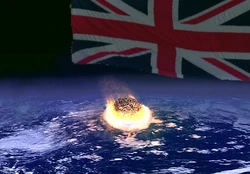| The following The British Ain't Coming page is under construction.
Please do not edit or alter this article in any way while this template is active. All unauthorized edits may be reverted on the admin's discretion. Propose any changes to the talk page. |
Je me souviens ("I remember") | |||||||
| Anthem | "Le Peuple Canadien" | ||||||
| Capital | Quebec | ||||||
| Largest city | Rouillé | ||||||
| Other cities | Nouvelle-Montreal, Sault. Ste Marie, Plaisance, Saint-Pierre | ||||||
| Language official |
French | ||||||
| others | Dutch, Aboriginal languages | ||||||
| Ethnic Groups main |
White (non-Hispanic) | ||||||
| others | Native American | ||||||
| Demonym | Canadia | ||||||
| Government | Unitary Parliamentary Constitutional Monarchy | ||||||
| Legislature | Parliament | ||||||
| King of Canada | Louis XX | ||||||
| Prime Minister of Canada | Jean-François Lisée | ||||||
| Population | 19.08 million | ||||||
| Established | July 3, 1608 | ||||||
| Independence | from France | ||||||
| declared | 1803 (As Quebecois Confederation, Dominion of the French Empire) | ||||||
| recognized | 1963 | ||||||
| Currency | Canadian franc (₣) (LAF)
| ||||||
| Time Zone | (UTC−5)-(UTC-4) | ||||||
| Internet TLD | .cd | ||||||
| Organizations | North American Confederation, NATO | ||||||
The Republic of Canada, or just Canada, is a sovereign state located in North America. Canada is a unitary state bordered by Alaska to the west, and New Orange and Louisiana to the south.
Etymology[]
While there are numerous theories on the etymological origins of Canada, the name is now generally accepted as coming from the St. Lawrence Iroquoian word kanata, meaning "village" or "settlement." In 1535, indigenous inhabitants of the present-day Quebec region used the word to direct French explorer Jacques Cartier to the village of Stadacona. Cartier later used the word Canada to refer not only to that particular village, but the entire area; by 1545, European books and maps had begun referring to this small region along the St Lawrence River as Canada.
From the 16th to the early 19th century "Canada" referred to the part of New France that lay along the St. Lawrence River. When New France declared independence and split in 1803, the part north and east of the Great Lakes became the independent nation of Canada.
History[]
| ||||||||||||||||||||||||




